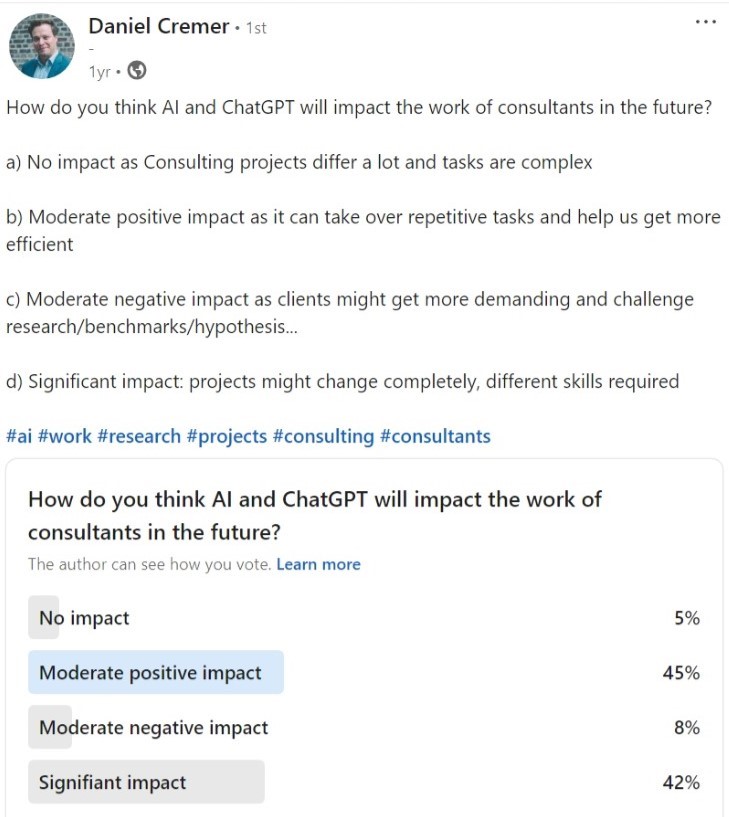The Future of Consulting: How AI and ChatGPT Could Transform the Industry
As artificial intelligence (AI) technologies like ChatGPT become increasingly sophisticated, the consulting industry is starting to feel their ripple effects. From brainstorming to benchmarks, consultants are considering how these tools might reshape their workflows and client interactions.
Daniel Cremer
1/10/20242 min read


Opinions vary widely, as seen in the poll results below:
No impact: 5%
Moderate positive impact: 45%
Moderate negative impact: 8%
Significant impact: 42%
Let’s explore these perspectives in detail.
1. No Impact (5%)
A small fraction of respondents believe AI and ChatGPT will have no significant impact on consulting. Their reasoning centers on the unique complexity of consulting projects. Every engagement involves tailored strategies, nuanced stakeholder management, and in-depth problem-solving—areas where AI might struggle to replace human expertise. Consultants often wear many hats, from strategic advisor to change agent, requiring skills that go beyond data processing and automation.
2. Moderate Positive Impact (45%)
The largest group anticipates a moderate positive impact, focusing on AI’s ability to handle repetitive tasks and boost efficiency. For instance, tools like ChatGPT can:
Summarize lengthy reports or research papers.
Generate first drafts of deliverables, saving valuable time.
Assist in data analysis by identifying patterns or trends.
These applications free consultants to focus on high-value activities, such as crafting strategies or managing client relationships. Efficiency gains could lead to faster project delivery and lower costs for clients, enhancing competitiveness in the consulting market.
3. Moderate Negative Impact (8%)
A smaller group foresees moderate negative consequences, noting that AI could raise client expectations and scrutiny. As AI tools make benchmarks and hypothesis generation faster, clients may demand even greater rigor and precision in consulting deliverables. Additionally, reliance on AI for preliminary tasks could lead to a devaluation of foundational skills, such as manual research and critical thinking, among junior consultants.
4. Significant Impact (42%)
A substantial portion of respondents predict AI will bring transformative changes to consulting. They argue that AI’s integration could fundamentally alter the nature of projects and the skills required for success. Here’s how:
Redefining projects: Traditional deliverables like reports may give way to AI-powered dashboards, real-time simulations, and predictive models.
Shifting skills: Consultants will need to develop fluency in AI tools, data science, and machine learning to remain relevant. Soft skills like emotional intelligence and strategic storytelling may also take center stage as AI handles more technical tasks.
Challenging traditional models: Clients might bypass traditional consulting firms for AI-driven platforms offering direct insights at a fraction of the cost.
Conclusion: Adapting to an AI-Driven Future
The consulting industry is no stranger to change, having evolved through economic shifts, technological advancements, and changing client needs. AI represents the next frontier, promising opportunities for growth and efficiency but also posing challenges to established norms.
The key to thriving in this new landscape will be adaptability. Consultants who embrace AI as a tool rather than a threat, and who invest in developing complementary skills, will be well-positioned for the future. As the poll suggests, the extent of AI’s impact will likely vary across firms, industries, and roles—but its influence is undeniable.
#AI #Work #Research #Projects #Consulting #Consultants
Connect
Partnering with you for exceptional leadership solutions.
contact@a-game-search.com
© 2024. All rights reserved.